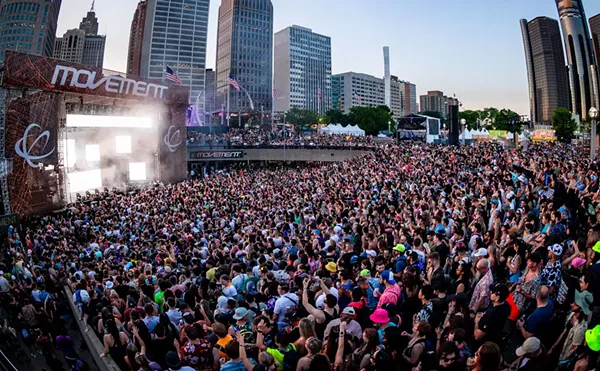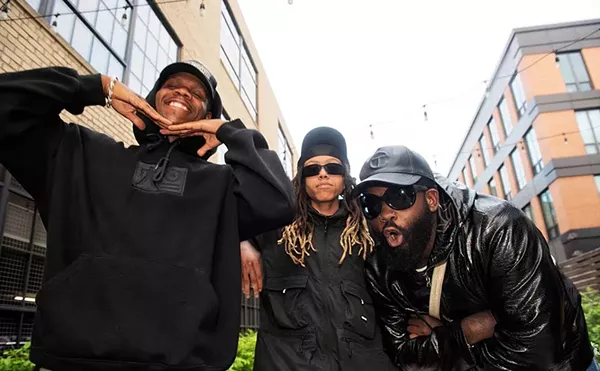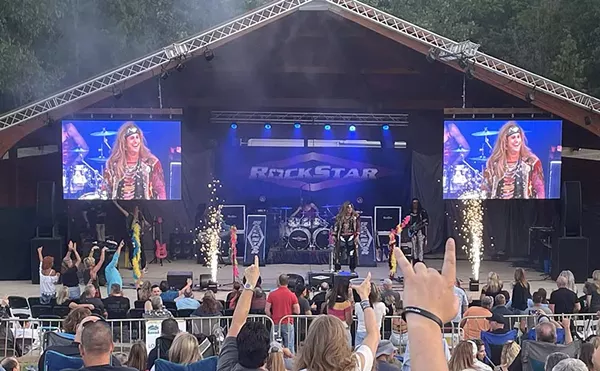
Audio By Carbonatix
[
{
"name": "GPT - Leaderboard - Inline - Content",
"component": "35519556",
"insertPoint": "5th",
"startingPoint": "3",
"requiredCountToDisplay": "3",
"maxInsertions": 100,
"adList": [
{
"adPreset": "LeaderboardInline"
}
]
}
]
Still, when Medeski, Martin and Wood return Saturday to headline the 25th Anniversary of the Ann Arbor Blues and Jazz Festival, you can rest assured that even from the heights of Gallup Park's stage they will be stirring up their own brand of funky sonic stew, in the hopes of giving everybody out there a taste.
"Our music is more about intimacy than epic rock 'n' roll fantasy," says bassist Chris Wood, slightly disappointed by the abrupt shift from smaller venues into the limelight of summer concert-circuit outdoor venues. "We try to connect with our audience and try to establish a two-way conversation with them."
One of those great bonding moments occurred in October 1995. Medeski, Martin and Wood went straight from their cover of Jimi Hendrix's "Crosstown Traffic" into their baddest strut, "The Lover." Everyone in the packed-beyond-capacity crowd at tiny Zoot's Coffee in Detroit was dancing so much that it seemed like the floor might give way at any moment. Wood enthused, "That's how we like it, with the audience in your face and dancing. If people are dancing -- and dancing well -- it can be very inspiring. It's an African concept, where the dancers affect the music and the music affects the dancers. It's what goes on in a lot of James Brown's music, too."
Wood, keyboardist John Medeski and drummer Billy Martin started playing together about six years ago. At first they were heavy on the acoustic tip, with Medeski playing piano during the trio's residencies at venues like the Village Gate in New York City. But when they made the decision to tour heavily, logistics prohibited taking a piano on the road, so Medeski began concentrating on a slightly more portable bank of keyboards -- especially the Hammond B-3 organ. With all the touring, both on their own and supporting the likes of Phish and Morphine, MMW soon found themselves with quite a diverse fanbase.
Not surprisingly, the three come from different backgrounds. Throughout the '80s, Medeski and Wood's paths crossed many times in the downtown NYC scene. Meanwhile Billy Martin came from a different side of the nightlife. Wood explained, "I think the reason this group has done well is that its sum is greater than its parts. We're all so different. Billy wasn't really from a jazz background. He was more involved with hip-hop and Brazilian music, and with African music. He has a way of applying his take on Brazilian rhythm and percussion to his drum set, and that makes for a unique sound."
After this tour, Medeski, Martin and Wood will be taking some time off to begin planning for their next record, which will find them switching from current home Gramavision to the Blue Note label. Among other historic jazz moments, Blue Note was home to many an electric soul-jazz superstar during the late '60s. It was on Blue Note records that titans like Jimmy Smith, Lou Donaldson and Grant Green blended the sophisticated sounds of modern jazz with the kinetic grooves of James Brown and Stax/Volt soul. That music later inspired acid jazz.
Modestly avoiding comparisons to such obvious precedents to the MMW sound, Wood merely concedes, "We're carrying on the spirit of music."
Some would call it acid jazz, but rather than wrestle with labels, Martin once quipped, "I prefer Sanford and Sun Ra." Which pretty much sums it up: Totally accessible grooves with out-there flourishes of improvisation. Besides the overdrive acid-funk dynamo that MMW can be live, Wood says the group isn't afraid to stretch out, perhaps explaining another part of MMW's appeal among the jam-oriented listening tastes of H.O.R.D.E. fans.
"We love to play music where people can just sit back and listen," says Wood, reminding us that for all of the Meters jam-bones in their gumbo, there's the downtown spice of Zorn and Ribot as well.
"We're willing to go anywhere," he says. And you just might want to go with them even if you miss those days of wishing that 50 people had stayed home so that you could not only dance at a Medeski, Martin and Wood show, but breathe.
Greg Baise writes frequently about music for the Metro Times. Greg Baise gets electric in the Metro Times. E-mail letters@metrotimes.com





